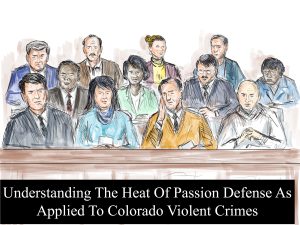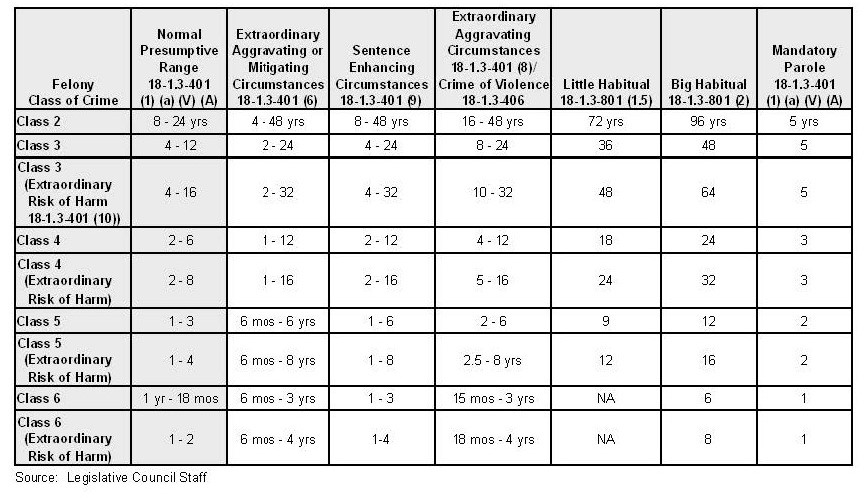Understanding The Heat Of Passion Defense As Applied To Colorado Violent Crimes
 By H. Michael Steinberg, Colorado Criminal Defense Lawyer
By H. Michael Steinberg, Colorado Criminal Defense Lawyer
Understanding The Colorado Heat Of Passion Defense: Definition And Legal Basis
The heat of passion “defense” is a legal defense strategy that seeks to mitigate the culpability of a person accused of certain Colorado crimes of violence. Unlike an affirmative defense, which is a complete defense to a conviction, the heat of passion “defense” mitigates, reduces the statutory penalty for a conviction of the crime charged.
One example is the Colorado Second-Degree Assault statute: Section 18-3-202(1)(a), C.R.S.
Second Degree Assault is punishable as a class three felony unless
… the act causing the injury is performed upon a sudden heat of passion, caused by a serious and highly provoking act of the intended victim, affecting the person causing the injury sufficiently to excite an irresistible passion in a reasonable person, and without an interval between the provocation and the injury sufficient for the voice of reason and humanity to be heard,
…. in which case the offense of Second Degree Assault is punishable as a class five felony. Section 18-3-202(2)(a)
The impact of a successful heat of passion jury finding is substantial:

The Heat Of Passion “Mitigator”
The heat of passion defense has deep historical roots. It is understood best as emerging from the understanding that human emotions can sometimes lead individuals to act impulsively and irrationally, particularly in situations involving intense personal relationships.
The law recognizes that extreme provocation—such as discovering infidelity or experiencing betrayal—can trigger overwhelming feelings that impair an individual’s ability to think clearly.
Legally, the heat of passion “defense” operates within the existing framework of a conviction for the crime charged. It does NOT excuse the crime charged but, if established in the eyes of the jury, reduces the level of punishment for that crime.
To successfully establish this “defense,” it must be demonstrated that the defendant acted under significant emotional duress at the moment of the assault and that the response was proportional to the provocation they experienced.
In the criminal courts of Colorado, juries are tasked with evaluating whether the emotional state of the defendant at the time of the offense warrants application of the heat of passion “mitigator.” The effectiveness of this defense can depend on various factors in the given case. These may include evidence of prior relationships, witness testimony regarding the emotional turmoil experienced by the defendant, and expert psychological testimony if available.
Ultimately, while not universally accepted or successful in every case, the heat of passion issue remains a pivotal consideration in cases involving violent acts stemming from deeply personal conflicts.
The defense raises complex issues about the more commonly held and well-understood notions of justice and accountability juxtaposed against the role of mental states and human emotions into the courtroom. When introduced into criminal cases, the heat of passion defense presents a challenge to classicly framed prosecutions for punishing violence.
A Real-World Example Of The Defense – The Impact Of A Heat Of Passion Defense In A Colorado Second-Degree Murder Case
What follows is the current Colorado Jury Instruction jury “provoked and sudden heat of passion” interrogatory (question a jury must answer) in a second-degree murder case where the defense has been properly raised:
3-1:08. INT MURDER IN THE SECOND DEGREE—INTERROGATORY (PROVOKED AND SUDDEN HEAT OF PASSION)
If you find the defendant not guilty of second-degree murder, you should disregard this instruction and sign the verdict form to indicate your not guilty verdict.
If, however, you find the defendant guilty of second-degree murder, you should sign the verdict form to indicate your finding of guilt, and answer the following verdict question on the verdict form:
Was the defendant acting upon a provoked and sudden heat of passion?
(Answer “Yes” or “No”)The defendant was acting upon a provoked and sudden heat of passion only if:
1. the act causing the death was performed upon a sudden heat of passion,
2. caused by a serious and highly provoking act of the intended victim,
3. affecting the defendant sufficiently to excite an irresistible passion in a reasonable person, and
4. between the provocation and the killing, there was an insufficient interval of time for the voice of reason and humanity to be heard.
A Significant Decrease In The Potential Sentencing Penalty
If a jury finds a second-degree murder was committed as a result of a sudden heat of passion, the possible penalty is significantly reduced.
In Colorado, a second-degree murder committed out of passion is still classified as second-degree murder; however, the penalties, again, are not as severe as they would be for other second-degree murders.
Second-degree murder committed during the heat of passion means a conviction for a class 3 felony (see above chart). Without the defense, second-degree murder is classified as a class 2 felony. With the successful assertion of the defense, a convicted criminal defendant faces 4 to 16 years in prison with 5 years of parole, and fines ranging from $3,000 to $750,000. If a second murder is determined to have been done with knowledge but not in the heat of passion, the penalty increases to 16 to 48 years in jail and fines up to $1 million.
A Closer Look At The Evolution Of The Crime Of Passion Defense In Colorado
The crime of passion defense in Colorado has evolved significantly over the decades, reflecting societal changes regarding emotional states and culpability.
Historically, this defense emerged from a cultural understanding that intense emotions, such as jealousy or betrayal, could temporarily impair an individual’s judgment.
As legal standards evolved throughout the mid-20th century, courts rigorously scrutinized several defenses. For example, the establishment of clearer definitions around manslaughter versus murder in Colorado law marked a pivotal moment. The introduction of objective standards for what constituted “adequate provocation” required defendants to demonstrate that their emotional state was genuine and understandable under the circumstances.
By the late 20th century and into the 21st century, societal attitudes shifted towards a greater emphasis on accountability and understanding mental health issues. This shift prompted courts to consider psychological evaluations as part of the defense strategy while balancing public safety concerns.
The Key Elements That Are Required To Establish The Colorado Crime Of Passion Defense
The heat of passion defense in Colorado hinges on several critical elements that must be established to demonstrate that the defendant acted under an intense emotional disturbance rather than with premeditated intent.
First, a defendant must show that they experienced a sudden and intense emotional reaction provoked by an event.
Example: The classic example is the emotional upheaval that arises from discovering infidelity or betrayal, leading to impulsive actions driven by overwhelming feelings.
Second, it is essential to illustrate that this emotional response was genuine and reasonable under the circumstances.
Context: The context surrounding the incident plays a crucial role; the actions taken must be viewed through the lens of what a typical person might feel in similar situations. This consideration helps differentiate between mere anger or jealousy and a profound psychological break.
Timing: Timing here is vital—there must be little to no time for reflection or cooling down after the triggering event. If there is evidence of premeditation or planning leading up to the act, it undermines claims of a crime of passion.
Establishing the Colorado heat of passion defense requires a nuanced understanding of both psychological factors and situational context. This allows juries to consider whether the defendant’s actions stemmed from an uncontrollable emotional state rather than the more familiar and calculated clear intent to commit the crime charged.
Challenges And Limitations Of The Crime Of Passion Defense In Court
The Colorado heat of passion defense is not without significant legal obstacles, challenges, and limitations. The primary obstacle is the subjective nature of the emotions involved in such cases. Jurors sometimes struggle to empathize with defendants who claim that intense emotional turmoil led to the commission of the crime charged. Jurors question the authenticity and immediacy of the claimed passion, and a kind of built-in skepticism can undermine the effectiveness of the defense. Jurors may view the heat of passion defense as an attempt to evade accountability rather than a legitimate response to provocation.
Establishing a Clear Link: Establishing a clear link between provocation and a resulting violent act poses a substantial challenge to the defense case at trial. In Colorado, defendants must demonstrate that their emotional state was intense and sudden, a criterion that can be difficult to substantiate through evidence or testimony.
Colorado’s Prosecutors often offer evidence or arguments to counter the heat of passion defense by asserting that the defendant had other options available to him or her at the time of the crime.
Summary And Conclusion – Understanding The Impact Of Heat Of Passion As Applied To Colorado Violent Crimes
The Colorado heat of passion defense is evolving to reflect changing societal attitudes based upon a greater understanding and awareness of the role of mental states in the alleged commission of crime. As society more intelligently shifts towards recognizing the complexities of human emotion and relationships, trials increasingly frame crimes of passion as involving a complex state of mind based on the unique facts and evidence in the individual case. It is the role of the criminal defense lawyer to educate juries on the nuances surrounding the mind of the defendant at the time of, and in the context of, the alleged commission of the crime.
Courts will likely continue to grapple with balancing the need for perceived justice against a more nuanced understanding of the compelling emotional triggers that interfere with the commonly accepted mental state of premeditation – specific intent that can lead individuals to commit acts of violence they would not otherwise consider.
Hope: It is hoped that advancements in psychological assessments will play a pivotal role in future heat of passion defenses. Expert testimony regarding mental health conditions and emotional distress, if permitted at trial, can become integral components in arguing for reduced culpability under this defense framework.
The heat of passion defense offers a potential avenue for mitigating culpability but the success of the defense will hinge on navigating difficult waters and bringing a greater understanding of the complex and intricate emotional dynamics of the mind as well as societal perceptions of the defense within a legal framework that demands clear evidence and rational justification.
For an excellent analysis on the concept of heat of passion by the Colorado Court of Appeals in People v. Villarreal – on this issue – follow this link:
________________________________________________________________________
The reader is alerted to the fact that Colorado criminal law, like criminal law in every state and at the Federal level, changes constantly. The article appearing above was accurate when it was drafted, but it cannot account for changes that occurred after it was uploaded.
 ABOUT THE AUTHOR: H. Michael Steinberg – Email The Author at hmsteinberg@hotmail.com
ABOUT THE AUTHOR: H. Michael Steinberg – Email The Author at hmsteinberg@hotmail.com
A Denver Colorado Criminal Defense Lawyer – or call his office at 303-627-7777 during business hours – or call his cell if you cannot wait and need his immediate assistance – please call 720-220-2277.
“A good criminal defense lawyer devotes themselves to their client’s case from beginning to end, always realizing that this case is the most important thing in that client’s life.”
Putting more than 40 years of Colorado criminal defense experience to work for you.
You should be careful to make a responsible choice when selecting a Colorado criminal defense lawyer. We encourage you to “vet” our firm. Over the last 40 years – by focusing ONLY on Colorado criminal law – H. Michael has had the necessary time to commit to the task of constantly updating himself on nearly every area of criminal law, including Colorado criminal law and procedure and trial and courtroom practice.
H. Michael works hard to get his clients the best possible results in and out of the courtroom. He has written extensively on Colorado criminal law and continues to write, and he hopes this article helps you in some small way.
 Colorado Criminal Lawyer Blog
Colorado Criminal Lawyer Blog

